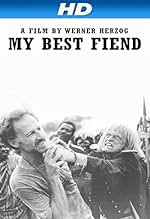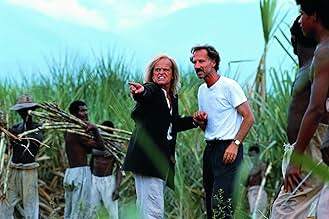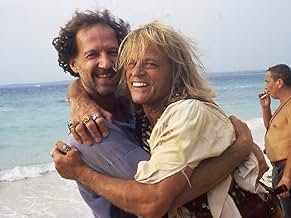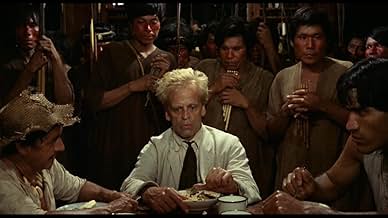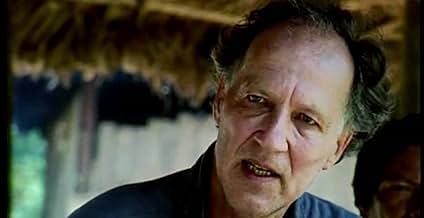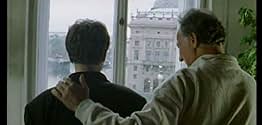IMDb-BEWERTUNG
7,8/10
12.708
IHRE BEWERTUNG
Die faszinierende Dokumentation gibt Einblicke in die von Hassliebe geprägte Zusammenarbeit des Regisseurs Werner Herzog und des genialen wie exzentrischen Schauspielers Klaus Kinski.Die faszinierende Dokumentation gibt Einblicke in die von Hassliebe geprägte Zusammenarbeit des Regisseurs Werner Herzog und des genialen wie exzentrischen Schauspielers Klaus Kinski.Die faszinierende Dokumentation gibt Einblicke in die von Hassliebe geprägte Zusammenarbeit des Regisseurs Werner Herzog und des genialen wie exzentrischen Schauspielers Klaus Kinski.
- Auszeichnungen
- 1 Gewinn & 2 Nominierungen insgesamt
Klaus Kinski
- Self
- (Archivfilmmaterial)
Guillermo Ríos
- Self
- (Archivfilmmaterial)
Andrés Vicente
- Self
- (Archivfilmmaterial)
Paul Hittscher
- Self
- (Archivfilmmaterial)
Mick Jagger
- Self - Wilbur
- (Archivfilmmaterial)
Thomas Mauch
- Self
- (Archivfilmmaterial)
Jason Robards
- Fitzcarraldo
- (Archivfilmmaterial)
Walter Saxer
- Self
- (Archivfilmmaterial)
Empfohlene Bewertungen
Fascinating portrait about a fascinating personality - filmed by one of the best and most important German directors. Werner Herzog and his star Klaus Kinski, who have been friends and foes all in one, were responsible for some of the greatest German movies ever made like "Aguirre", "Nosferatu" or "Cobra Verde", which got their brilliance in the first place from their inimitable main actor. In this documentary you see some scenes from their common films, but the best moments are the rare footages, like Kinski´s notorious cholerical outbursts of rage for example. Werner Herzog was one of the persons who knew this genius and madman best - an extreme relationship between love and hate, what´s also reflected on the whole film: a love letter as well as a requital!
This fascinating documentary is not really about a madman. It's about two madmen. While it's quite obvious from the outset that Klaus Kinski is a nutcase, it becomes more and more apparent that Werner Herzog himself is a pretty crazed character as well. For anyone who has seen Aguirre, the Wrath of God or Fitzcarraldo this will come as no surprise, seeing as those two movies were pretty crazy undertakings to begin with. Travelling down the Amazon on primitive rafts and dragging steamboats over hills are not the sort of activities carried out by normal film makers. Repeatedly making films with Kinski was perhaps an even less sane idea but Herzog made five features with this most demented actor. The films themselves are completely engrossing and unique. This documentary is likewise.
Having read Kinski's autobiography 'Kinski Uncut' I was under no illusions of what I was going to encounter here. The book is a quite extraordinary account. Surely there has never been a star autobiography quite like this one? Full of aggression, madness and pornographic detail of his sexual exploits, this was the work of a deranged individual. Kinski didn't really focus on his film career, he concentrated much more on his sexual liaisons and was not shy at hurling insults around at famous people. For instance, he declined a role offered to him from Federico Fellini because the money was not good enough, he dismissed Fellini with the words 'Go and have yourself f---ed in the ass!'. I couldn't imagine Tom Hanks saying this to Steven Spielberg to be perfectly honest. In the book too, Kinski continually makes clear his severe dislike for Herzog. In My Best Fiend, Herzog suggests that both men worked on the insults together in order to make the book more sensational. I do have to wonder to the legitimacy of this claim, as it does seem strange. From what I have seen Kinski needed no assistance in coming up with insults to hurl at anyone, least of all Werner Herzog.
So, similar to Kinski's book, the account given by Herzog in this documentary is a highly subjective one. You really can never be sure the true extent of the truth, and you never will be. But My Best Fiend is a terrific film whatever the case. Herzog is incapable of being boring and he does capture the essence of the relationship between these two striking individuals very well. There are a number of other people interviewed too, who worked with these men on these films and this adds a great deal to the story. While there is some fantastic footage of Kinski to appreciate, from the pure unhinged insanity of his Jesus Christ Savior performance, to his intense ranting over a minor food-based complaint on the set of Fitzcarraldo, to the extraordinary gentleness of his interaction with a butterfly.
This film is a rarity in that it is one that can just as easily be enjoyed even if you have no knowledge of the films made by the two principal characters. Both men are just too unorthodox and the relationship so fraught that the story of their relationship is enough in itself. For fans of the movies themselves, this is of course, an absolute must.
Having read Kinski's autobiography 'Kinski Uncut' I was under no illusions of what I was going to encounter here. The book is a quite extraordinary account. Surely there has never been a star autobiography quite like this one? Full of aggression, madness and pornographic detail of his sexual exploits, this was the work of a deranged individual. Kinski didn't really focus on his film career, he concentrated much more on his sexual liaisons and was not shy at hurling insults around at famous people. For instance, he declined a role offered to him from Federico Fellini because the money was not good enough, he dismissed Fellini with the words 'Go and have yourself f---ed in the ass!'. I couldn't imagine Tom Hanks saying this to Steven Spielberg to be perfectly honest. In the book too, Kinski continually makes clear his severe dislike for Herzog. In My Best Fiend, Herzog suggests that both men worked on the insults together in order to make the book more sensational. I do have to wonder to the legitimacy of this claim, as it does seem strange. From what I have seen Kinski needed no assistance in coming up with insults to hurl at anyone, least of all Werner Herzog.
So, similar to Kinski's book, the account given by Herzog in this documentary is a highly subjective one. You really can never be sure the true extent of the truth, and you never will be. But My Best Fiend is a terrific film whatever the case. Herzog is incapable of being boring and he does capture the essence of the relationship between these two striking individuals very well. There are a number of other people interviewed too, who worked with these men on these films and this adds a great deal to the story. While there is some fantastic footage of Kinski to appreciate, from the pure unhinged insanity of his Jesus Christ Savior performance, to his intense ranting over a minor food-based complaint on the set of Fitzcarraldo, to the extraordinary gentleness of his interaction with a butterfly.
This film is a rarity in that it is one that can just as easily be enjoyed even if you have no knowledge of the films made by the two principal characters. Both men are just too unorthodox and the relationship so fraught that the story of their relationship is enough in itself. For fans of the movies themselves, this is of course, an absolute must.
Werner Herzog: Every grey hair on my head, I call Kinski.
The documentary made by Werner Herzog tells about the legendary love-hate relationship between the director who was ready to climb to Hell for his every movie and border-line insane genius actor Klaus Kinski who might have been one of the creatures from Hell that Herzog had to face. It is hard to imagine two people more different than Herzog and Kinski: "...stone and waves, the coldest ice and hottest flames have more in common, differ less" but they both were driven and obsessed artists. Famous for his wild and ferocious talent and temperament to match, Kinski was incredibly difficult to work with. He wrote about himself, "I am a wild animal born in captivity, in a zoo but where beast would have claws, I have talent".
Kinski's talent was fully realized in five films that he made with Werner Herzog over a fifteen-year working period, starting with astounding "Aguirre, the Wrath of God" (1973), and then following with "Fitzcarraldo," "Nosferatu" (1979), inspired by Murnau's silent vampire classic; "Woyzeck" (1979), about a 19th century army private who seems mad to others because he looks and acts so differently from them, and "Cobra Verde" (1988). It is impossible to imagine any other actor starring in these films and they are without doubt the best Kinski ever made (and he made hundreds of films). Thanks to the Herzog's documentary we are able to learn what exactly went on behind the stunning images and unforgettable performances. According to Herzog, "people like Marlon Brando are just kindergarden comparing to Kinski. He is mad and unpredictable." They liked each other, they hated each other, and they respected each other at the same time making plans to murder each other.
Kinski, who respected Herzog, and valued his friendship, confessed to the director that in his autobiography he would describe their relationship in not very flattering terms - otherwise, the crowd would not read it. Herzog recalls how they both would sit together at the bench after the shooting and discuss what Kinski would write in his book. I am curious if they discussed and agreed upon the following passage and if Herzog helped Kinski with some of the colorful metaphors: "I absolutely despise this murderous Herzog! Huge red ants should p**s into his lying eyes, gobble up his balls, penetrate his a**hole and eat his guts."
Even after watching the fascinating documentary, it is difficult to fully understand the relationship between two giants but as Herzog admits, the only thing that counts is what we see on the screen and what we see is amazing.
The documentary made by Werner Herzog tells about the legendary love-hate relationship between the director who was ready to climb to Hell for his every movie and border-line insane genius actor Klaus Kinski who might have been one of the creatures from Hell that Herzog had to face. It is hard to imagine two people more different than Herzog and Kinski: "...stone and waves, the coldest ice and hottest flames have more in common, differ less" but they both were driven and obsessed artists. Famous for his wild and ferocious talent and temperament to match, Kinski was incredibly difficult to work with. He wrote about himself, "I am a wild animal born in captivity, in a zoo but where beast would have claws, I have talent".
Kinski's talent was fully realized in five films that he made with Werner Herzog over a fifteen-year working period, starting with astounding "Aguirre, the Wrath of God" (1973), and then following with "Fitzcarraldo," "Nosferatu" (1979), inspired by Murnau's silent vampire classic; "Woyzeck" (1979), about a 19th century army private who seems mad to others because he looks and acts so differently from them, and "Cobra Verde" (1988). It is impossible to imagine any other actor starring in these films and they are without doubt the best Kinski ever made (and he made hundreds of films). Thanks to the Herzog's documentary we are able to learn what exactly went on behind the stunning images and unforgettable performances. According to Herzog, "people like Marlon Brando are just kindergarden comparing to Kinski. He is mad and unpredictable." They liked each other, they hated each other, and they respected each other at the same time making plans to murder each other.
Kinski, who respected Herzog, and valued his friendship, confessed to the director that in his autobiography he would describe their relationship in not very flattering terms - otherwise, the crowd would not read it. Herzog recalls how they both would sit together at the bench after the shooting and discuss what Kinski would write in his book. I am curious if they discussed and agreed upon the following passage and if Herzog helped Kinski with some of the colorful metaphors: "I absolutely despise this murderous Herzog! Huge red ants should p**s into his lying eyes, gobble up his balls, penetrate his a**hole and eat his guts."
Even after watching the fascinating documentary, it is difficult to fully understand the relationship between two giants but as Herzog admits, the only thing that counts is what we see on the screen and what we see is amazing.
I can't help but like Klaus Kinski. Sure that's easy for me to say, having only encountered him on film, but despite (or probably because of) the madness, the anger and the raving, there's something magnetic about the man. He's like no other actor out there. No one else was so crazy, so passionate and so captivating. He was certainly one of a kind.
However, despite my regard for him as an actor, I can't say that I envy those who had to work with him. Raving fits, shootings and murder plots aren't par for the course when it comes to the majority of movie shoots. Hell, they're not normal by any standards. But then again, Klaus Kinski and Werner Herzog are far from ordinary people. Both had their madness one explicit and one masked and both went to extraordinary lengths to get what they wanted.
I think the piece in the film that best illustrated their shared madness was the story behind Kinski's 'autobiography'. Now to have biography that is largely fictional is nothing new, as people always rewrite their lives, but to have the person that you're insulting have you help insult them is rather extraordinary. It suggests a sadomasochism and a perversity in their relationship. But it also suggests a twisted affection. They hated each other and yet loved each other. No matter how hard they tried they couldn't stop gravitating towards one another.
And it seems that this strange attraction was there from the beginning. After the amazing 'Jesus' footage, the film opens with Herzog reliving his early childhood experiences with Kinski. Just listening to the stuff is amazing. Apparently, before he moved into the halfway house that Herzog used to live in, Kinski used to live naked in an apartment that was filled with leaves. But then once he did move, he proceeded to ruin bathrooms, knock doors down, assault theatre critics ("I was not excellent! I was not extraordinary! I was monumental! I was epochal!"), and my favourite thing of all, rave at the woman who gave him free board, free food, and who did his laundry, for not ironing his shirts neatly enough. The man was a maniac. Yet I can imagine the young Herzog watching these displays in awe. If only someone could harness this energy.
Well, as Herzog's films prove, he certainly harnessed it. But as you'd expect, it was never smooth sailing. Kinski continually caused havoc on set and the bizarre incidents piled up higher and higher. But although listening to Herzog recount these incidents is fascinating enough, the footage itself is amazing. We only get to see snippets of the 'Fitzcarraldo' documentary, but the 'mild' raving fit that is shown illustrates what Herzog was dealing with every day. Sheer madness! In the footage that is shown it's an argument over food, but it really could be anything. Indeed, Herzog often says that Kinski would erupt for the smallest of reasons. But to see Kinski in action is amazing. He's like an animal.
Yet despite the madness, the film also manages to convey Kinski's warmth. There's some wonderful footage at a film festival in America where Herzog and Kinski embrace and joke with one another. In light of what comes before it's really surprising, as it seems impossible to imagine such moments between the two. But when you see it you can't help but come to the conclusion that the two men really did have a deep affection for one another. As well as the hate, there was a lot of love between the two. I also loved the Pongo footage from the 'Fitzcarraldo' documentary. Again you get to see the kindness that Kinski possessed, as he bandages the camerman's hand.
But although the film reveals a lot about Kinski, Herzog still remains something of an enigma. It's clear that he loved and hated Kinski there's one scene where Herzog is talking to a photographer and he suddenly looks overwhelmingly sad, almost like a widower but we're never really allowed to get into his head. In fact, there's one bit where he says that Kinski thought that he was mad but he assures us that he's 'clinically sane'. But as he stands there, holding onto a tree, he does look quite mad. And for all we know he may well be, or may well have had his madness, as what sane person could tolerate Kinski's pestilence?
But mad or not, it doesn't matter. The films that Herzog and Kinski made together are amongst the best in the world, and Herzog's documentary is a captivating, amusing, disturbing, and ultimately, moving tribute to his colleague and friend. The final minutes, in particular, I loved.
However, despite my regard for him as an actor, I can't say that I envy those who had to work with him. Raving fits, shootings and murder plots aren't par for the course when it comes to the majority of movie shoots. Hell, they're not normal by any standards. But then again, Klaus Kinski and Werner Herzog are far from ordinary people. Both had their madness one explicit and one masked and both went to extraordinary lengths to get what they wanted.
I think the piece in the film that best illustrated their shared madness was the story behind Kinski's 'autobiography'. Now to have biography that is largely fictional is nothing new, as people always rewrite their lives, but to have the person that you're insulting have you help insult them is rather extraordinary. It suggests a sadomasochism and a perversity in their relationship. But it also suggests a twisted affection. They hated each other and yet loved each other. No matter how hard they tried they couldn't stop gravitating towards one another.
And it seems that this strange attraction was there from the beginning. After the amazing 'Jesus' footage, the film opens with Herzog reliving his early childhood experiences with Kinski. Just listening to the stuff is amazing. Apparently, before he moved into the halfway house that Herzog used to live in, Kinski used to live naked in an apartment that was filled with leaves. But then once he did move, he proceeded to ruin bathrooms, knock doors down, assault theatre critics ("I was not excellent! I was not extraordinary! I was monumental! I was epochal!"), and my favourite thing of all, rave at the woman who gave him free board, free food, and who did his laundry, for not ironing his shirts neatly enough. The man was a maniac. Yet I can imagine the young Herzog watching these displays in awe. If only someone could harness this energy.
Well, as Herzog's films prove, he certainly harnessed it. But as you'd expect, it was never smooth sailing. Kinski continually caused havoc on set and the bizarre incidents piled up higher and higher. But although listening to Herzog recount these incidents is fascinating enough, the footage itself is amazing. We only get to see snippets of the 'Fitzcarraldo' documentary, but the 'mild' raving fit that is shown illustrates what Herzog was dealing with every day. Sheer madness! In the footage that is shown it's an argument over food, but it really could be anything. Indeed, Herzog often says that Kinski would erupt for the smallest of reasons. But to see Kinski in action is amazing. He's like an animal.
Yet despite the madness, the film also manages to convey Kinski's warmth. There's some wonderful footage at a film festival in America where Herzog and Kinski embrace and joke with one another. In light of what comes before it's really surprising, as it seems impossible to imagine such moments between the two. But when you see it you can't help but come to the conclusion that the two men really did have a deep affection for one another. As well as the hate, there was a lot of love between the two. I also loved the Pongo footage from the 'Fitzcarraldo' documentary. Again you get to see the kindness that Kinski possessed, as he bandages the camerman's hand.
But although the film reveals a lot about Kinski, Herzog still remains something of an enigma. It's clear that he loved and hated Kinski there's one scene where Herzog is talking to a photographer and he suddenly looks overwhelmingly sad, almost like a widower but we're never really allowed to get into his head. In fact, there's one bit where he says that Kinski thought that he was mad but he assures us that he's 'clinically sane'. But as he stands there, holding onto a tree, he does look quite mad. And for all we know he may well be, or may well have had his madness, as what sane person could tolerate Kinski's pestilence?
But mad or not, it doesn't matter. The films that Herzog and Kinski made together are amongst the best in the world, and Herzog's documentary is a captivating, amusing, disturbing, and ultimately, moving tribute to his colleague and friend. The final minutes, in particular, I loved.
10sound-4
I first caught this film midway through, when it was on IFC. Not only did it stop me in my tracks, but I looked up to see when it would next be on so I could set the VCR. Though Herzog attempts to portray himself as the cool and reasonable half of this dastardly duo, his own megalomania and ego shine through. This documentary catches on film the fine edge between brilliance and insanity, and the result is simply stunning. This is not a biography of Kinski but rather a kind of valentine to him that celebrates his (and Herzog's) mad genius.
Wusstest du schon
- WissenswertesIn some footage of one of his notorious on-set flare-ups, Klaus Kinski yells at Werner Herzog that he's "a dwarf director!" This apparently random insult is a specific reference to Herzog's movie Auch Zwerge haben klein angefangen (1970).
- Zitate
Werner Herzog: Every grey hair on my head, I call Kinski.
Top-Auswahl
Melde dich zum Bewerten an und greife auf die Watchlist für personalisierte Empfehlungen zu.
- How long is My Best Fiend?Powered by Alexa
Details
- Erscheinungsdatum
- Herkunftsländer
- Sprachen
- Auch bekannt als
- Mein liebster Feind
- Drehorte
- Produktionsfirmen
- Weitere beteiligte Unternehmen bei IMDbPro anzeigen
Box Office
- Bruttoertrag in den USA und Kanada
- 95.612 $
- Eröffnungswochenende in den USA und in Kanada
- 7.677 $
- 7. Nov. 1999
Zu dieser Seite beitragen
Bearbeitung vorschlagen oder fehlenden Inhalt hinzufügen

Oberste Lücke
By what name was Mein liebster Feind - Klaus Kinski (1999) officially released in India in English?
Antwort

